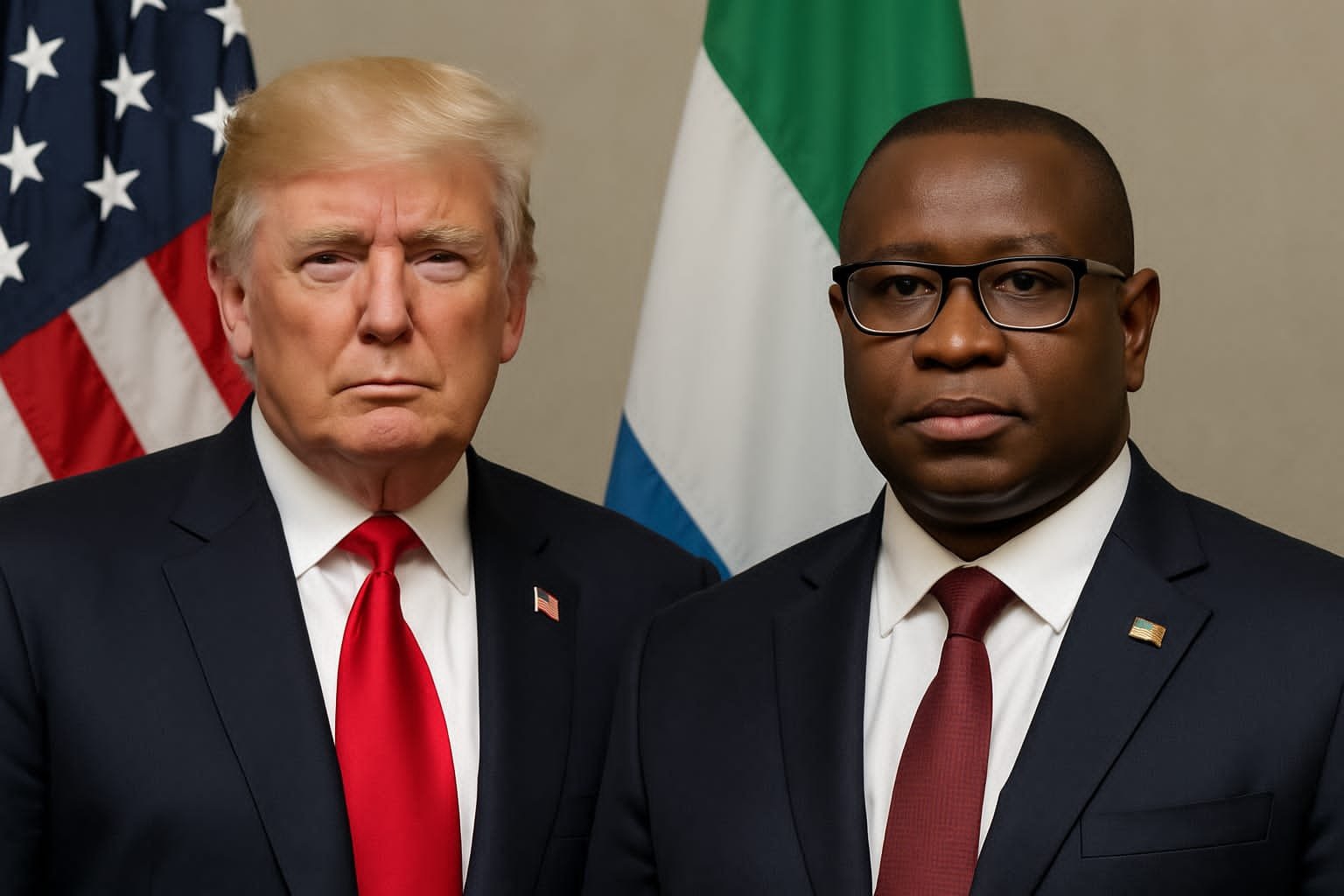Donald Trump (left) and Julius Maada Bio
By Alpha Amadu Jalloh | For Africa Publicity
When current U.S. President Donald J. Trump extended invitations to five African Presidents for a high-profile summit at the White House in Washington DC, the diplomatic world paused in anticipation. Among those invited were the Presidents of Gabon, Guinea-Bissau, Liberia, Mauritania and Senegal. But one notable name was missing. Julius Maada Bio, the President of Sierra Leone and the newly appointed Chairman of the Economic Community of West African States, ECOWAS.
It was more than just an oversight. It was a deliberate statement. President Trump, known for his sharp instincts and unapologetic style, ignored the very man who, on paper, should have spoken on behalf of the West African region. No invitation. No recognition. No relevance. Just silence.
And that silence spoke volumes. Especially for Bio, who had only recently begun basking in the glow of his ECOWAS appointment, styling himself as the face of constitutional democracy in a region increasingly shaped by military-led regimes. His rhetoric against military governments, particularly his fixation on Captain Ibrahim Traoré of Burkina Faso, positioned him as a bold defender of democratic norms. Yet behind the bravado stood a man whose past and present contradict every principle he claims to uphold.
History does not forget. Nor does Africa.
Julius Maada Bio is not a stranger to coups. He helped orchestrate one in 1992 under Valentine Strasser and staged another against Strasser himself in 1996. He later reinvented himself as a civilian democrat. But his record in office has been marred by electoral controversies, suppression of dissent and questions about human rights. For such a leader to now seek legitimacy by criticizing others who once walked the same path is hypocrisy laid bare.
Trump’s White House snub has exposed the hollowness of Bio’s regional influence. Across Africa, the reaction has been swift and merciless. Social media exploded. Commentators mocked the ECOWAS Chairman who could not even secure a seat at the table. Even in cities like Ouagadougou and Bamako, where Bio’s condemnations had echoed loudly, there was quiet satisfaction. The man who threw stones from a glass house has now found himself shut out.
For ECOWAS, the embarrassment is deeper. A bloc already weakened by its failure to prevent coups or enforce meaningful regional cooperation now finds its leader sidelined. Trump’s summit made clear that ECOWAS, under Bio, is seen as symbolic, not strategic. The White House was not dismissing the region. It was rejecting what the bloc has become.
For Sierra Leone, the consequences are painfully national. Citizens were told their President had stepped into global leadership. That Sierra Leone was now at the front of Africa’s diplomatic train. But reality tells a different story. Their leader was not even considered. The snub shattered that illusion and turned triumph into shame.
What about the loyalists? The government media operatives? The sycophants who flooded platforms celebrating Bio’s appointment? They are now silent. The drums of praise have stopped beating. The trumpet of victory has been replaced by awkward whispers and unanswered questions.
Let us speak plainly. Trump’s invitation list was not an error. It was intentional. He invited leaders he sees as relevant to trade, diplomacy and Africa’s forward-looking agenda. Whether one agrees with his style or not, he understands perception. And Bio, in Trump’s view, was not worth the effort.
This is not just about one summit. It is about leadership. About substance over title. Bio’s own contradictions, past military rule, and recent governing tactics have made him a questionable figure. The snub is not just personal. It is institutional. It is continental. And it is loud.
Videos from across Africa now show Bio in fatigues, addressing troops in his early years. Others show him today, speaking of democracy while silencing journalists and jailing critics. The contrast is striking. The laughter from ordinary Africans is not about politics. It is about betrayal. The betrayal of a man who promised democracy but carried the weight of dictatorship.
At this moment, one cannot help but recall the words of Nelson Mandela, a leader whose humility elevated him far above the rest. He once said,
“It is better to lead from behind and to put others in front, especially when you celebrate victory when nice things occur. You take the front line when there is danger. Then people will appreciate your leadership.”
These words are the mirror to Maada Bio’s failure. His leadership has been about himself, not his people. About posturing, not humility. About ambition, not legacy.
Julius Maada Bio may still be Chairman of ECOWAS in name. But that name no longer commands the respect he imagined. His absence in Washington was not an accident. It was a verdict. And the message is clear. Africa’s future cannot be shaped by men whose pasts they refuse to reconcile.
From Chairman to outcast, Bio has fallen. Not by the hands of his opponents. But by the weight of his own inflated ego.
About the writer:
Alpha Amadu Jalloh is a Sierra Leonean political commentator, human rights advocate and author of “Monopoly of Happiness.” He writes frequently on governance, democracy and leadership across Africa.








